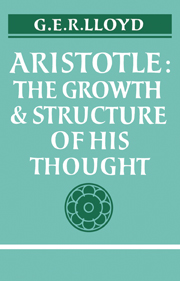Book contents
- Frontmatter
- Contents
- Preface
- Abbreviations
- PART I INTELLECTUAL DEVELOPMENT
- PART II FUNDAMENTALS OF ARISTOTLE'S THOUGHT
- 6 Logic and metaphysics
- 7 The physics of the heavenly region
- 8 The physics of the sublunary region
- 9 Psychology
- 10 Ethics
- 11 Politics
- 12 Literary criticism
- 13 Conclusion
- Suggestions for farther reading
- Glossary of Greek terms
- Index of passages referred to
- General Index
9 - Psychology
Published online by Cambridge University Press: 06 July 2010
- Frontmatter
- Contents
- Preface
- Abbreviations
- PART I INTELLECTUAL DEVELOPMENT
- PART II FUNDAMENTALS OF ARISTOTLE'S THOUGHT
- 6 Logic and metaphysics
- 7 The physics of the heavenly region
- 8 The physics of the sublunary region
- 9 Psychology
- 10 Ethics
- 11 Politics
- 12 Literary criticism
- 13 Conclusion
- Suggestions for farther reading
- Glossary of Greek terms
- Index of passages referred to
- General Index
Summary
In many ways Aristotle's doctrine of the ψΥχή is the linchpin of his whole philosophy: certainly it is the key to his philosophy of nature and it provides an important link between his physics, his ethics and his theology. Of all natural objects, it is those that are alive that provide the clearest and most dramatic illustrations of the role of the final cause—the young animal and the seed of the plant growing into mature specimens. The doctrine that different living creatures possess different vital functions plays, as we shall see, an important part in his conception of happiness: happiness and the good for man are defined in terms of the activity of the ψΥχή, but particularly in terms of that faculty which man alone among the animals possesses, namely reason. So the highest activity for man is the activity of reason, contemplation. Living creatures are arranged in a hierarchy according to the faculties of the ψΥχή they possess, and this scale extends upwards to include the gods. While men have reason along with other, lower faculties of the ψΥχή, the gods possess reason alone, and the activity of the unmoved mover is, as we have seen, described as continuous untrammelled contemplation.
Conventionally, translated ‘soul’, the term ψΥχή has a range far wider than either ‘soul’ or ‘mind’ in English, for it covers every vital function from reproduction, through sensation and locomotion, to reason.
- Type
- Chapter
- Information
- AristotleThe Growth and Structure of his Thought, pp. 181 - 201Publisher: Cambridge University PressPrint publication year: 1968



